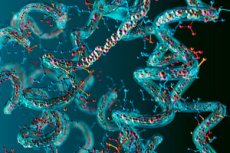Nye publikasjoner
Statiner kan blokkere en betennelsesvei som er involvert i kreftutvikling
Sist anmeldt: 02.07.2025

Alt iLive-innhold blir gjennomgått med medisin eller faktisk kontrollert for å sikre så mye faktuell nøyaktighet som mulig.
Vi har strenge retningslinjer for innkjøp og kun kobling til anerkjente medieområder, akademiske forskningsinstitusjoner og, når det er mulig, medisinsk peer-evaluerte studier. Merk at tallene i parenteser ([1], [2], etc.) er klikkbare koblinger til disse studiene.
Hvis du føler at noe av innholdet vårt er unøyaktig, utdatert eller ellers tvilsomt, velg det og trykk Ctrl + Enter.

En ny studie utført av forskere ved Massachusetts General Cancer Center, et sentralt medlem av Mass General Brigham Health System, viser at statiner – mye brukte kolesterolsenkende legemidler – kan blokkere en spesifikk kreftvei involvert i utviklingen av kreft drevet av kronisk betennelse. Funnene er publisert i tidsskriftet Nature Communications.
«Kronisk betennelse er en viktig årsak til kreft over hele verden», sa seniorforfatter Sean Demery, MD, PhD, hovedforsker ved Center for Cancer Immunology og Center for Skin Research ved Massachusetts General Hospital og førsteamanuensis i dermatologi ved Harvard Medical School. «Vi undersøkte mekanismen der miljøgifter utløser starten på kronisk betennelse som disponerer for hud- og bukspyttkjertelkreft», sier Demery, som også er en Bob and Rita Davis Family MGH Research Scholar 2023–2028. «I tillegg undersøkte vi trygge og effektive behandlinger for å blokkere denne banen for å undertrykke kronisk betennelse og dens kreftfremkallende konsekvenser.»
Studien til Demery og kollegene hans baserte seg på cellelinjer, dyremodeller, menneskelige vevsprøver og epidemiologiske data. Celleeksperimentene viste at miljøgifter (som allergener og kjemiske irritanter) aktiverer to sammenkoblede signalveier kalt TLR3/4 og TBK1-IRF3. Denne aktiveringen fører til produksjon av et protein kalt interleukin-33 (IL-33), som stimulerer betennelse i hud og bukspyttkjertel, noe som kan bidra til kreftutvikling.
I en screening av et bibliotek med FDA-godkjente legemidler fant forskerne at statinet pitavastatin effektivt undertrykte IL-33-ekspresjon ved å blokkere aktivering av TBK1-IRF3-signalveien. Hos mus undertrykte pitavastatin miljøbetennelse i hud og bukspyttkjertel og forhindret utvikling av inflammatorisk kreft i bukspyttkjertelen.
I prøver av humant bukspyttkjertelvev var IL-33 overuttrykt i prøver fra pasienter med kronisk pankreatitt (betennelse) og bukspyttkjertelkreft sammenlignet med normalt bukspyttkjertelvev. I en analyse av elektroniske pasientjournaldata fra mer enn 200 millioner mennesker i Nord-Amerika og Europa ble bruk av pitavastatin også assosiert med en betydelig redusert risiko for kronisk pankreatitt og bukspyttkjertelkreft.
Resultatene tyder på at det å blokkere IL-33-produksjonen med pitavastatin kan være en trygg og effektiv forebyggende strategi for å undertrykke kronisk betennelse og den påfølgende utviklingen av visse kreftformer.
«Vårt neste steg er å undersøke nærmere effekten av statiner på å forhindre kreftutvikling i forbindelse med kronisk betennelse i leveren og mage-tarmkanalen, og identifisere andre nye terapeutiske tilnærminger for å undertrykke kronisk betennelse som disponerer for kreft», sa Demery.
